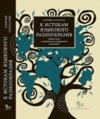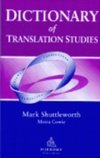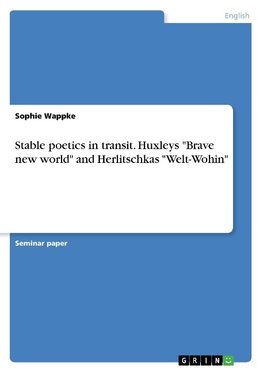
-
 Anglický jazyk
Anglický jazyk
Stable poetics in transit. Huxleys "Brave new world" and Herlitschkas "Welt-Wohin"
Autor: Sophie Wappke
Seminar paper from the year 2015 in the subject American Studies - Comparative Literature, grade: 2.3, University of Kassel, language: English, abstract: In the first chapter the work of translation as a form of literary art will be explained. Especially... Viac o knihe
Na objednávku, dodanie 2-4 týždne
16.28 €
bežná cena: 18.50 €
O knihe
Seminar paper from the year 2015 in the subject American Studies - Comparative Literature, grade: 2.3, University of Kassel, language: English, abstract: In the first chapter the work of translation as a form of literary art will be explained. Especially the works of Greiner and Gadamer were of great help in outlining the vast but young field of literary translation. The chapter focuses on the development of literary translations as a field of study and on the translator's role as a mediator between cultures.
The second chapter focuses on the genre of utopianism. In order to analyze Herlitschka's translation, this aspect of methodological knowledge is crucial. A short abstract of the genre's development will be given. Also, the etymological definition of utopia will be explored. Furthermore, the words dystopia and anti-utopia will be defined. After these rather technical definitions, utopia, dystopia and anti-utopia will be defined as literary concepts. How are they different? And which concept does BNW identify with? The concepts of alienation and the importance of the reader will thus be touched upon, too.
Helpful throughout the whole chapter was especially the Cambridge Companion to Utopian literature.
After having laid out the theoretical and methodological foundation of this paper, the third chapter commences with the analysis of Herlitschka's translation. In a first step, the narrative structure will be focused on.
Also, Herlitschka's poetics will be studied in depth in order to present in detail whether his translation is a piece of own literary art or not. Following this thought it is important to see how he dealt with crucial passages. How did he alter the syntax? How is the English "you" translated to the German "du" or "Sie"?
Speaking of alteration, the characters and their renaming will be covered in a next step. Does Herlitschka change the notions characters imply in BNW? If so how does he utter this linguistically? Why are many names and all places changed?
Specifics that seem typical in Herlitschka's translation will be slightly touched upon. Not all specifics will be named but the most striking ones will be explained. Interesting is to see how he deals with vocabulary repetition and different semantic notions words have when being transferred to another language.
- Vydavateľstvo: GRIN Verlag
- Rok vydania: 2016
- Formát: Paperback
- Rozmer: 210 x 148 mm
- Jazyk: Anglický jazyk
- ISBN: 9783668266834
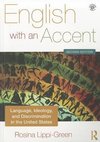


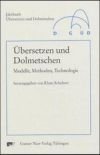
 Nemecký jazyk
Nemecký jazyk 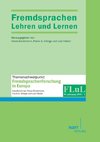
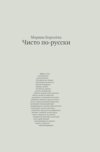
 Ruský jazyk
Ruský jazyk 

